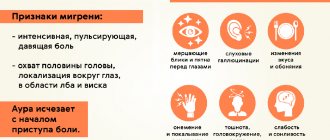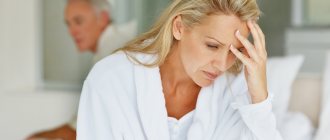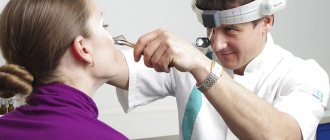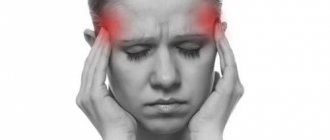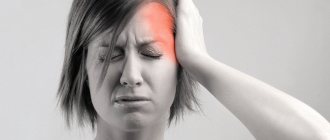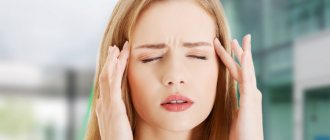Constant headaches are a common reason for patients to turn to neurologists at the Yusupov Hospital. People experience headaches in the evening, in the morning after sleep, which do not go away after taking painkillers, and at night. Frequent headaches in men can occur in the presence of pathology of cerebral vessels or brain tumors.
Persistent headache is an indication for a comprehensive examination of the patient. Neurologists conduct instrumental analyzes using the latest equipment from leading global manufacturers. Analyzes are performed by experienced laboratory technicians. Patients are advised by candidates and doctors of medical sciences. Leading specialists in the field of headache treatment collectively develop tactics for managing patients whose headache does not go away for several days.
Non-pathological causes of daily headaches
Brain activity is disrupted due to minor disturbances in blood supply, metabolism, and innervation. Night headaches occur for the following reasons:
- lack of oxygen;
- high temperature in the bedroom;
- drinking alcohol in the evening;
- overwork.
Healthy sleep depends on bedding and posture. On a high pillow, the cervical spine bends strongly. Even in the absence of discomfort during sleep, muscle tension occurs and cerebral blood flow is disrupted. Sleeping without a pillow can also cause pain in the head and neck. Low-quality fabric dyes and softeners used to wash bed linen often contain harmful ingredients that cause breathing problems and headaches in the morning.
Experiences and intense mental activity in the evening lead to brain overstrain. At night he cannot switch off. The patient cannot sleep and often wakes up. After waking up, you feel discomfort, pain in the head, and fatigue. He gets morning headaches.
Depression and anxiety disorder
Mood disorders often lead to chronic headaches. Naturally, this negatively affects the quality of life. In addition, depression and anxiety are often accompanied by insomnia.
Scientists have discovered a connection between affective disorders and headaches: Headache, depression and anxiety: associations in the Eurolight project. They analyzed data from 6 thousand participants from different European countries, and it turned out that abuse (medicinal) headaches are most often associated with depression and anxiety. It occurs from excessive use of painkillers. In second place is tension headache, in third place is migraine.
Nikita Zhukov
neurologist-epileptologist, author of the books “Moditsina” and “Moditsina². Apology”, creator of the Encyclopatia resource.
It is considered safe to take NSAIDs (Nonsteroidal anti-inflammatory drugs. - Ed.) for headaches no more than every other day. More frequent use already indicates that such a headache tends to become chronic. Painkillers will not correct this situation; they will only make it worse by masking the true nature of the pain.
Antidepressants are usually prescribed to treat mood disorders. Many of them help you sleep better, and some prevent migraines. Therefore, if you notice signs of anxiety disorder or depression, be sure to contact a specialist. Don't try to treat yourself.
Pathological causes of headaches
A common cause of nighttime headaches is oxygen deficiency. It may be caused by abnormalities of the nasal passages and respiratory tract diseases. Night headaches occur after sleep apnea.
Blood supply to the brain is impaired during hypotension. The outflow of venous blood worsens due to a decrease in the tone of the intracranial veins. In the morning the patient feels it in his head.
With arterial hypertension, blood pressure may increase during sleep. The reason is the patient’s age, disruption of sleep and rest patterns. Vascular tone is impaired in diseases of the thyroid gland and heart. Nocturnal hypertension is dangerous for the development of heart failure and stroke. Headache occurs at night or in the morning.
Stress, anxiety, and mental trauma affect the central nervous system and change vascular tone. This provokes an increase in blood pressure and irritation of pain receptors in the walls of blood vessels. Night headaches that occur under the influence of psychogenic factors are varied in nature. They are accompanied by irritability, rapid heartbeat and are not relieved by analgesics.
Diseases of the cervical spine and temporomandibular joint can provoke night headaches. With back pain, a person is forced to take an uncomfortable position, which causes spasms of the neck muscles. They cause headaches.
Failure to comply with the dosage of glucose-lowering medications or refusal to eat dinner in diabetes mellitus results in a sharp decrease in blood glucose levels and severe headaches. Histamine disease is characterized by prolonged attacks of acute headache in the orbital area in the evening and at night.
In the presence of brain tumors, patients complain of night and morning headaches. As the disease progresses, it intensifies. The head hurts when changing position, the patient's hands go numb.
Throbbing morning headaches are felt during migraines. They often intensify when the light is turned on and are accompanied by nausea and vomiting. Constant headaches that bother the patient night and day are characteristic of brain infections.
Why does my head hurt after a nap?
The causes of headaches after sleep during the day are divided into pathological and non-pathological. The first are diseases that require treatment. The latter are associated with environmental factors and do not threaten human health.
Pathological reasons:
- cardiovascular problems;
- daytime apnea;
- physical fatigue the day before;
- depression;
- migraine.
Non-pathological reasons:
- incorrect head position during sleep;
- poorly chosen pillow;
- lack of fresh air in the bedroom;
- excess sleep.
Headaches caused by too much sleep are often associated with poor body position in bed.
Cluster headaches
Attacks of cluster (bundle) headaches occur in paroxysms and are difficult for patients to tolerate. The pain has the following characteristics:
- localized in the eye area;
- radiates to the forehead, temple, cheek;
- accompanied by lacrimation, sweating of the forehead, a rush of blood to the face;
- more acutely felt when the patient is lying down;
- starts and goes away suddenly.
Night headaches begin without cause between 9:00 p.m. and 9:00 a.m. The peak of pain occurs at night, from zero to three o'clock. Attacks occur cyclically, followed by painless periods. Attacks are observed mainly in men. Pain occurs after drinking alcohol.
Men whose relatives suffer from cluster pain are at risk. The risk of developing a painful attack increases with head injuries, migraines, sleep disorders, mental and physical stress. Neurologists include possible causes of cluster headaches:
- abnormalities of the hypothalamus;
- pathology of blood vessels;
- disruption of circadian rhythms.
Patients relieve an acute attack at home with lidocaine drops in the nose. For symptomatic therapy, neurologists prescribe special medications and oxygen inhalations. In difficult cases, electrical stimulation of the brain is performed and the nerves that cause pain are removed. During the cluster period, doctors recommend giving up alcohol and nicotine.
When to see a doctor
If the headache appears one-time or has objective causes, you can cope with it yourself. For this there are analgesics - Nurofen, Analgin, Ketorol. You can take them no more than 2 times a week. If this does not help, you need to think about going to a specialist.
Signs that you need to see a doctor:
- The pain occurs more often than 2 times a week.
- This was not observed before, but now headaches often occur, especially in people over 50 years of age.
- The attack is accompanied by stiffness in the neck.
- There was a head injury or a situation in which it could have been caused.
- In addition to pain, the person has nausea, fever, vomiting, but there are no acute respiratory viral infections or other diagnosed infections.
- The attack is accompanied by loss or clouding of consciousness, double vision.
If you have headaches, you should consult a therapist or a neurologist immediately. The doctor will order an examination and find out the cause of the condition, and also select the right treatment.
Independent attempts to get rid of pain can lead to complications in the gastrointestinal tract due to painkillers, as well as to aggravation of the underlying disease.
Dear patients! Remember that only a qualified doctor can make an accurate diagnosis, determine the causes and nature of the disease, and prescribe effective treatment. You can make an appointment with our specialists or call a doctor at home by calling 8-(4822)-33-00-33
Be healthy and happy!
Diagnosis of headache
Neurologists at the Yusupov Hospital determine the cause and type of persistent headache based on data from a clinical examination of the patient, instrumental and laboratory research methods. Doctors at the Neurology Clinic prescribe the following diagnostic procedures:
- Doppler ultrasound of head and neck vessels;
- electromyography;
- electrocardiography;
- diagnostic spinal puncture (if a neuroinfection is suspected).
Computed tomography and magnetic resonance imaging are performed if a brain mass is suspected. To determine the condition of the cerebral vessels, contrast angiography or multislice tomography is performed.
Headache after evening sleep
This is often due to a shift in circadian rhythms, when sleep occurs at an unusual time for the brain. If waking up after an evening sleep is accompanied by weakness, it means sleep was interrupted in the deep phase . This condition can cause headaches.
After a short (usually afternoon) nap lasting 20-30 minutes, you may also get a headache. The cause of pain is usually the same - awakening in a deep phase.
Symptoms
The discomfort manifests itself in the form of the following symptoms:
- fatigue, weakness;
- the desire to sleep increases;
- feeling of heaviness in the head;
- pain syndrome;
- congestion, tinnitus;
- dry eyes;
- pain in the neck and shoulders.
Why do my head and eyes hurt after a nap? This is also due to the above reasons. Symptoms appear either one at a time or several at the same time. However, they may have varying degrees of severity. This is due to the circumstances and conditions under which the dream took place.
Physiology
Newborn babies sleep 16 hours a day. At the same time, for them, daytime rest is considered not only a normal phenomenon, but also a physiological need, which is associated with inadequate development of the nervous system. Do adults need naps during the day? If the correct daily routine is observed, then a night's rest will be enough to keep a person alert during working hours.
But due to the modern rhythm of life, not everyone can follow the correct daily routine, so 8 hours of sleep at night may not be enough. Therefore, some people prefer to rest during the day. Proper sleep is not a 30-minute nap in inappropriate conditions. Therefore, the result that appears is not the one expected. There is a feeling of fatigue, headache, which disrupts the usual rhythm.
Prevention methods
Timely prevention will protect against the occurrence of headaches in the morning and the development of dangerous chronic diseases. At home, it is enough to follow a few simple rules to maintain good health after waking up:
- follow a diet that excludes excess salt and spices, instant coffee, and alcoholic drinks;
- give up fatty foods, strong coffee and tea, alcohol before bedtime;
- spend time outdoors, frequently ventilate the sleeping area;
- monitor your weight and regularly engage in light physical activity;
- Consult your doctor about choosing a mattress and pillow.
At the Clinical Brain Institute, you can undergo a complete diagnosis and treatment of headaches that appear in the morning after sleep. Programs are developed individually, depending on the symptoms and data from the initial examination. The center has the opportunity to get advice from experienced specialists of a narrow and broad profile who will be able to make an accurate diagnosis and prescribe the most effective treatment using only the necessary techniques. However, at home it is important to follow all instructions and follow the rules for preventing headaches.
Clinical Brain Institute Rating: 3/5 — 42 votes
Share article on social networks




